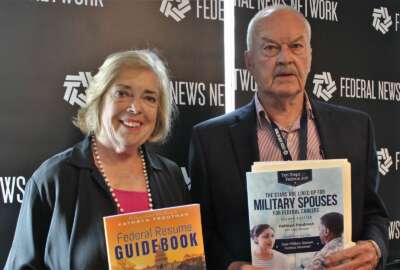Military spouse? Don’t ask, don’t tell
Slightly more than half of members of the Armed Forces are married and many of their spouses need to work. But getting a job can be difficult.
This article was originally published June 26, 2019.
Slightly more than half (54.8%) of members of the Armed Forces are married. Many of their spouses want, or need, to work but getting a job can be difficult, especially in some professional and administrative fields.
Many companies don’t want to invest in, train or pay somebody who almost certainly will be transferring, because of their spouse, in a year or two, year after year.
Telling a potential employer your spouse is in the military can hurt your chances of getting the good job you want, otherwise qualify for and need — big time.
In the past, hunting military spouses and civilian feds subject to frequent transfers have hidden, or tried to hide the fact that they are not “career” material because of the person they married. Some employers are reluctant to hire someone who will almost certainly be relocating because of normal rotation, or maybe even sooner in the event of an emergency.
It puts a double burden on military families where two incomes isn’t a luxury, it’s a fact-of-life. But things may be changing thanks to new military spouse preference rules.
Job expert Kathryn Troutman, president of The Resume Place, has a new book aimed at military spouses looking for good, career-level jobs. Recent rule changes should make it easier for them to get decent jobs and stop hiding or downplaying the fact they are part of a mobile military-federal marriage. The trick is knowing the new rules and format changes and learning how to make your individual resume stand out.
Troutman is also the author of the “Federal Resume Guidebook,” the first ever book on federal resume writing, and the No. 2 resume book in the country. She’ll be my guest today at 10 a.m. EDT on Your Turn here on www.federalnewsnetwork.com or on 1500 AM in the Washington, D.C. area. The show will also be archived for future listening.
Tell a friend in your job-hunting community. In the meantime, here are some of the 12 job hunting secrets we will be talking about:
- There is no more registration for federal jobs with the Priority Placement Program for Spouses (PPP-S) or any other program. PPP-S, which was a program to get military spouses into Defense Department positions, went away April 1. If previously registered in PPP-S, participants were deactivated on that date and can now use USAJobs to apply to any position for which they feel qualified.
- Documents are important — military spouses must upload their service member’s PCS Orders, their marriage certificate and, for DoD jobs, the PPP Checklist into USAJob’s application system to utilize the MSP hiring authority. Even if an applicant is very qualified, missing paperwork makes them ineligible.
- Military spouses can apply to “federal employee” announcements on USAJobs that allow military spouse applicants. The key here is to search for a green widget on the job posting that looks like two wedding rings hooked together. That’s the sign that military spouses are eligible for that particular opening.
- With “military spouse” and “federal employee/military spouse” positions, Veterans’ Preference is not applied. With the military spouse and federal employee announcements there is an equal playing field among the applicants: Federal employees, Veterans Employment Opportunity Act veterans, military spouses, Schedule A applicants – all of the other special hiring authorities.
- Military spouses can add their PCS military career history to their federal resumes. That way, they will be easily identified as a military spouse and gaps in their work history will be understood. This is a new idea developed by author Kathryn Troutman. She was looking for a way to make the resumes of military spouses stand out. Her book, “The Stars Are Lined Up for Military Spouses for Federal Careers” (second edition) provides six excellent sample fed resumes that show how military spouses can best present their atypical background that is dedicated to the military service career.
- Another improvement: EO-13473 can be used the entire time at each installation, instead of the former two years. Troutman noted that the original rules were very difficult. The spouse had to get family situated and adjusted, and also land a job in two years on base. No more!
Nearly Useless Factoid
By Amelia Brust
The English word “janitor” comes from the Roman god Janus, believed to have two faces and who represented the beginning and the end. He was considered the gatekeeper of the universe, and his symbols included keys and a porter’s staff. By the 1500s the term could refer to a custodian or caretaker responsible for looking after a building. Today’s janitors still often carry a set of keys to every door.
Source: Dictionary.com
Copyright © 2025 Federal News Network. All rights reserved. This website is not intended for users located within the European Economic Area.
Mike Causey is senior correspondent for Federal News Network and writes his daily Federal Report column on federal employees’ pay, benefits and retirement.
Follow @mcauseyWFED





